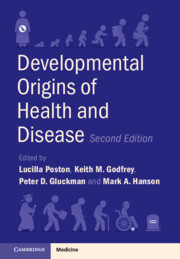Book contents
- Developmental Origins of Health and Disease
- Developmental Origins of Health and Disease
- Copyright page
- Contents
- Contributors
- Preface
- Section I Overview
- Section II Exposures Driving Long-Term DOHaD Effects
- Section III Outcomes
- Section IV Mechanisms
- Chapter 14 Visualizing Structural Underpinnings of DOHaD
- Chapter 15 Molecular and Epigenetic Mechanisms of DOHaD
- Chapter 16 The Role of the Placenta in DOHaD
- Section V Interventions
- Section VI Public Health and Policy Implications of Interventions
- Index
- References
Chapter 14 - Visualizing Structural Underpinnings of DOHaD
from Section IV - Mechanisms
Published online by Cambridge University Press: 01 December 2022
- Developmental Origins of Health and Disease
- Developmental Origins of Health and Disease
- Copyright page
- Contents
- Contributors
- Preface
- Section I Overview
- Section II Exposures Driving Long-Term DOHaD Effects
- Section III Outcomes
- Section IV Mechanisms
- Chapter 14 Visualizing Structural Underpinnings of DOHaD
- Chapter 15 Molecular and Epigenetic Mechanisms of DOHaD
- Chapter 16 The Role of the Placenta in DOHaD
- Section V Interventions
- Section VI Public Health and Policy Implications of Interventions
- Index
- References
Summary
Structural compromises are one of the important underpinnings of the developmental origins of health and disease. Quantifying anatomic changes during development is difficult but improved technology for clinical imaging has brought new research opportunities for visualizing such alterations. During prenatal life, maternal malnutrition, toxic social stress and exposure to toxic chemicals change fetal organ structures in specific ways. High placental resistance suppresses cardiomyocyte endowment. New imaging techniques allow quantification of nephrons in cadaverous kidneys without tedious dissection. High fat diets can lead to fatty liver and fibrosis. Pancreatic islet numbers and function are compromised by poor maternal diets. Both social and nutritional stressors change wiring and cellular composition of the brain for life. Advances in optical imaging also offer exciting new technologies for viewing structure and function in cells stressed during development.
- Type
- Chapter
- Information
- Developmental Origins of Health and Disease , pp. 133 - 145Publisher: Cambridge University PressPrint publication year: 2022
References
- 1
- Cited by

